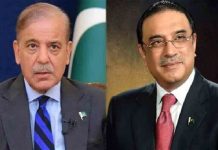By Ajmal Khan Yousafzai
ISLAMABAD: President Dr Arif Alvi Wednesday said that Pakistan understood the value of peace and it had been continuously talking of peace which was in sharp contrast to the belligerent designs of India.
Addressing at the inaugural session of a seminar titled “Global strategic threat and response 2020’, organized by the Center for Aerospace and Security Studies (CASS), the president said after assuming power, Prime Minister Imran Khan made a peaceful gesture to India, offering it to resolve all the issues peacefully.
The PM’s offer of ‘taking two steps if India takes one’ was not reciprocated by the eastern neighbour, he said.
Pakistan, as peace gesture, had also returned the Indian captured pilot, despite Indian aggression during February last, he added.
Chief of Air Staff, Air Chief Marshal Mujahid Anwar Khan, renowned defence analysts, experts, diplomats and academics attended the event.
The president, dilating upon the topic, said that the global order was rapidly changing, but he was disappointed with such developments as the humanity still refused to learn from its bitter experiences of wars.
History was the witness to the fact that wars were used as tools for exploitation and loot of the regions and resources and with the passage of time, dynamics of warfare had undergone a sea change from gun powder to the supersonic missiles, he observed.
He regretted that the Muslim world had also suffered due to the interests of others.
With wars, peace could not be achieved, neither such spectacles could contribute towards the rebuilding of nations, he added.
The president said the world had been confronted with latest challenges like xenophobia and Islamophobia.
Due to these changes and threats, it was necessary for Pakistan to have nuclear capability to thwart all ill designs of its enemies and secure itself, he added.
The president observed that in the modern warfare and technological revolution, it had become imperative to preserve resources, besides adoption of a strategy to look beyond the current trends.
Along with such issues, poverty, education, health, pollution and social disparity were the other common challenges, faced by the world community, he added.
The president said the technological revolutions in the modern warfare also brought complexities as with slight error, the world could be plunged into disaster as evident during Cuba crises.
The president said it was an era of cyber and hybrid wars and the technological revolution. Human DNA took thousands of years to change but the artificial intelligence could take hours to develop such software, he added. About the impacts of social media, the president said that now these tools were used to affect minds of the people which could be another type of warfare.
The president also shared his concerns over the ‘new destructive economic order,’ quoting certain renowned authors and scholars.
He observed that the western interests were swaying the global bodies in which morality and justice often found no place.
He referred to the perilous situation in the Indian Occupied Jammu and Kashmir and the latest attacks against Muslims and carnage in India to make his point.
Speaking on the occasion, President of Centre for Aerospace and Security Studies (CASS) Air Chief Marshal (retired) Kaleem Saadat said that the CASS had been the new think-tank in the twin cities which studied the global transformative and destabilizing transitions in the global order.
He said the world had been passing through the best and worst of times due to the enormous challenges from cyber tech to aerospace, security and environmental degradation, global tyranny of the rich and inequality of life. Under the age of technological divide, the global powers had been out to assume more powers, impacting the developing world, he added. The former air chief also called upon the international community to take notice of the coercive and sham democracy in India which was also posing threat to the world.
Cameron Munter, former US ambassador to Pakistan, said that Pakistan’s issues like economy and climate change, would be the key factors to face the emerging new global order. He said the old world had been fading, but the new world had not yet shaped itself.
Munter noted that climate change, technological challenges including biological inventions and governance system would be the main three problems, faced by the world community in the new world order.
The former envoy said that Pakistan should make most of the opportunities and challenges from the new world order. The strengthening of multilateral ties and regional outreach could play an important role in this regard, he added.




